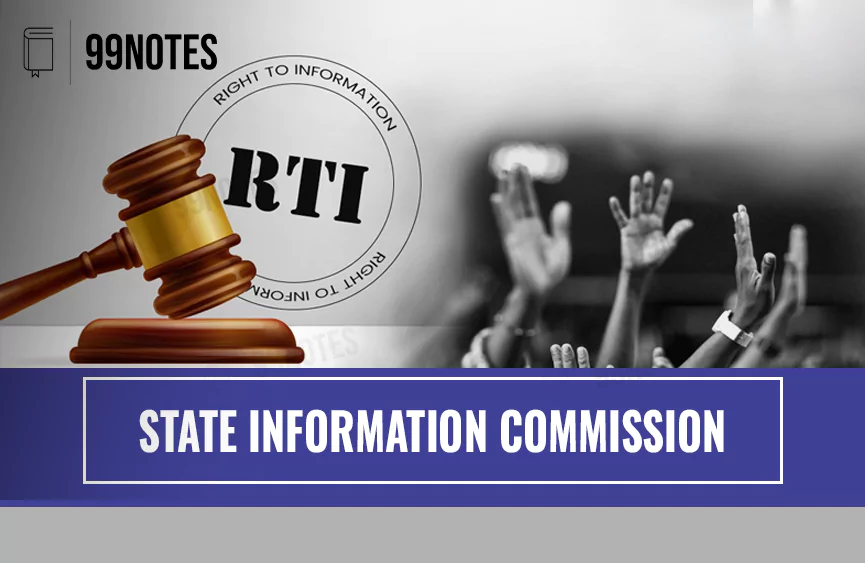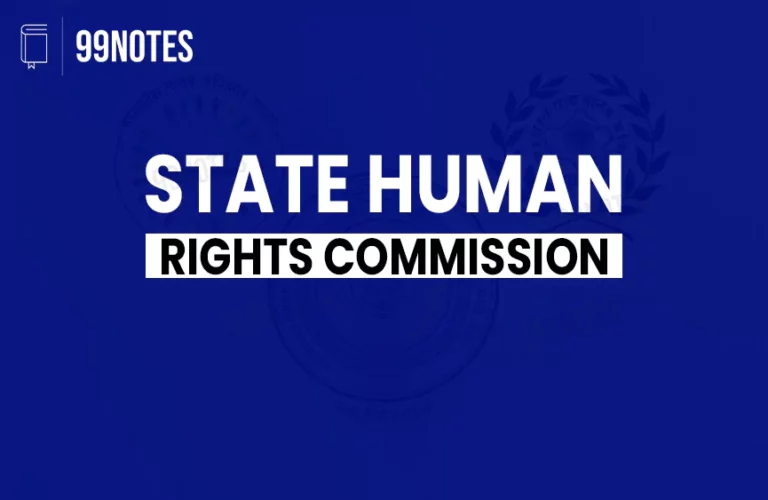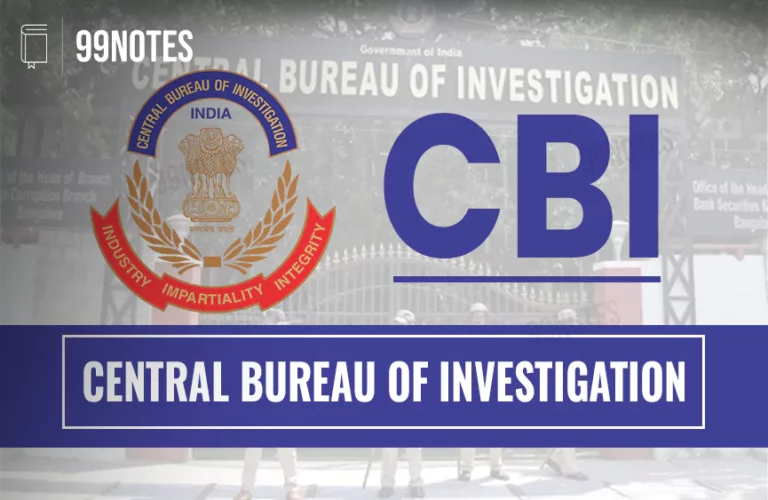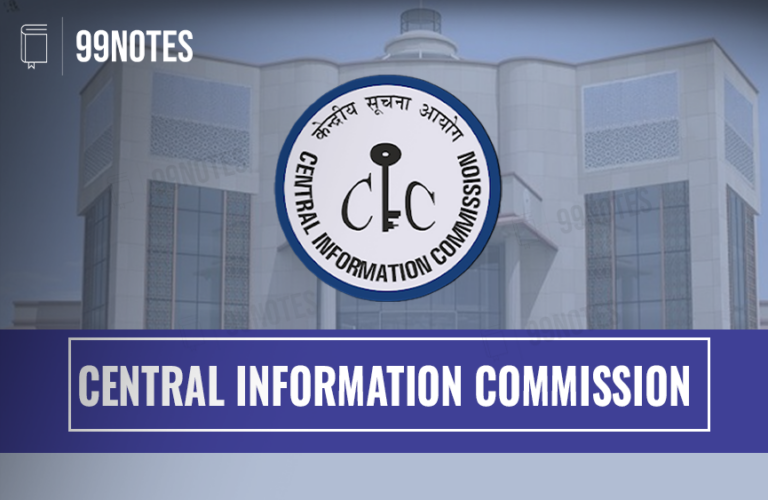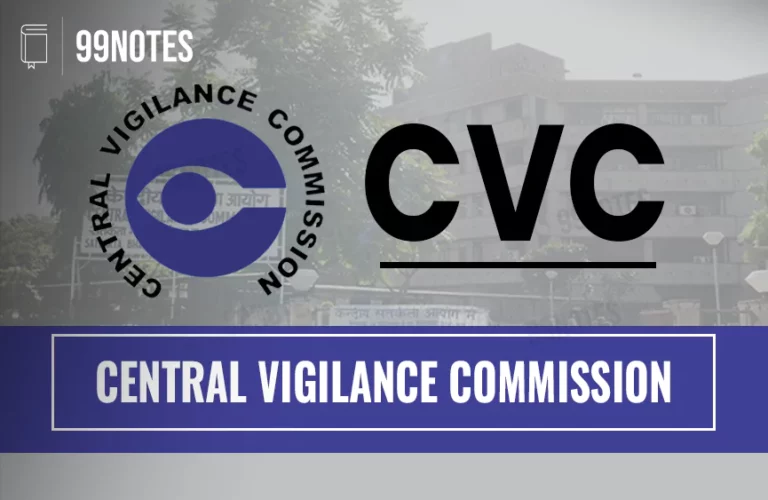State Information Commission UPSC Notes
State Information Commission
The Right to Information Act, 2005, besides the Central Information Commission, also provides for the State Information Commission.
It has been mandated to act upon the complaints and appeals under the act against public information officers in offices, financial institutions, and Public sector undertakings under the concerned state government.
Besides, the Commission is also entrusted with the duty of monitoring the public authorities and sending reports to the state legislature about the implementation of the provisions of the act. It also has the authority to provide recommendations about the efficient working of the act.
Constitution and Composition of the State Information Commission
- Section 15 (1) of the Right to Information Act, 2005 provides for the constitution of the state information commission.
- The state information commissioner consists of :
-
- The State Chief Information Commissioner;
- Not more than 10 state information commissioners.
Qualification of Members of State Information Commission
- The State Chief Information Commissioner and state information commissioners should be a person of eminence in public life, possessing extensive knowledge and expertise in fields such as law, social service, science and technology, management, journalism, mass media, or administration and governance.
- Further, they should not be an MP or MLA of any state or union territory or, hold any other office of profit or related to any political party or carry out any business or profession.
Appointment of State Information Commissioner’s
The Governor appoints the state chief information commissioner and other state information commissioner on the recommendation of a selection committee consisting of:
- The Chief Minister (Chairperson of the selection committee);
- The leader of the opposition (LoP) of the legislative assembly; and
- A state cabinet Minister (nominated by the CM)
Note: Where the leader of the opposition is not recognised as such, the leader of the single largest party in the legislative assembly will be deemed as the leader of the opposition in the legislative assembly.
Service Conditions of the State CIC and ICs
In 2019, the central government amended the service conditions of the CIC and ICs at both union and state levels by amending the Right to Information Act 2005. Here is the amended service conditions of the state Chief Information Commissioner (CIC) and Information Commissioner (ICs):
- Tenure of State Information Commissioner: The amended act authorises the central government to determine the term of office of the State CIC and ICs. As per rules notified under the amended act, the state Chief information commissioner and state information commissioners hold office for a period of 3 years from the date of entering the office.
- Reappointment: The state CIC is not eligible for reappointment; however, state ICs can be appointed as SCIC (but maximum duration, including their term, as IC cannot exceed 5 years).
- Pay: The amended act authorises the central government to determine the salary, allowances and other service conditions of the state CIC and ICs. As per notified rules under the amended act, the salary of the state CIC and ICs has been fixed at ₹25 lakhs per month.
Note: The salary and allowances of the state CIC and ICs cannot be varied to their disadvantage during service.
Resignation, Removal and Suspension of the State CIC and ICs
- The state CIC and ICs can resign at any time by addressing their resignation letter to the Governor.
- As per section 14 (1) of the RTI Act, the chief information commissioner and other information commissioners can be removed only on the order of the Governor on the grounds of proved misbehaviour or incapacity after the Supreme Court (on the reference made by the Governor) holds an enquiry and upholds the charges made and advises so.
Note: If the state Chief Information Commissioner or an Information Commissioner is involved or has a vested interest in any state government contract, agreement, or benefits resulting from it, except as a member of an incorporated company, it is considered misbehaviour for the purposes of section 14 (1).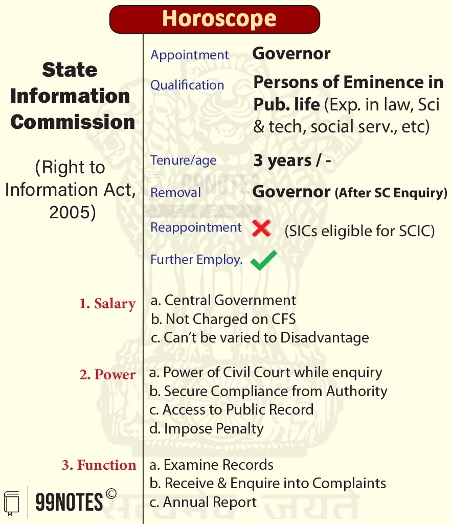
Additionally, the Governor may order the removal of the state CIC and ICs in the following circumstances:
- If s/he is adjudged an insolvent;
- Has been convicted of an offence which, in the opinion of the Governor of the state, qualifies as moral turpitude;
- Takes on any paid employment outside of their official responsibilities while serving in office;
- Is, in the opinion of the Governor of the state, unfit to continue in office by reason of infirmity of mind or body;
- Has acquired such financial or other interest that might adversely affect his/her role as the Chief Information Commissioner or an Information Commissioner”.
Suspension: Section 17 (2) of the Right to Information Act, 2005 empowers the Governor to suspend the CIC and ICs from office and, if deemed necessary, to prohibit them from office during the enquiry [regarding misbehaviour and incapacity].
Powers and Functions of the State CIC and ICs
The powers and functions of the state CIC and ICs are the same as those of the central CIC and ICs. You can read it here.
Appellate Jurisdiction of the Commission
The appellate jurisdiction of the state Information Commission is the same as that of the central information commission. You can read it here.

